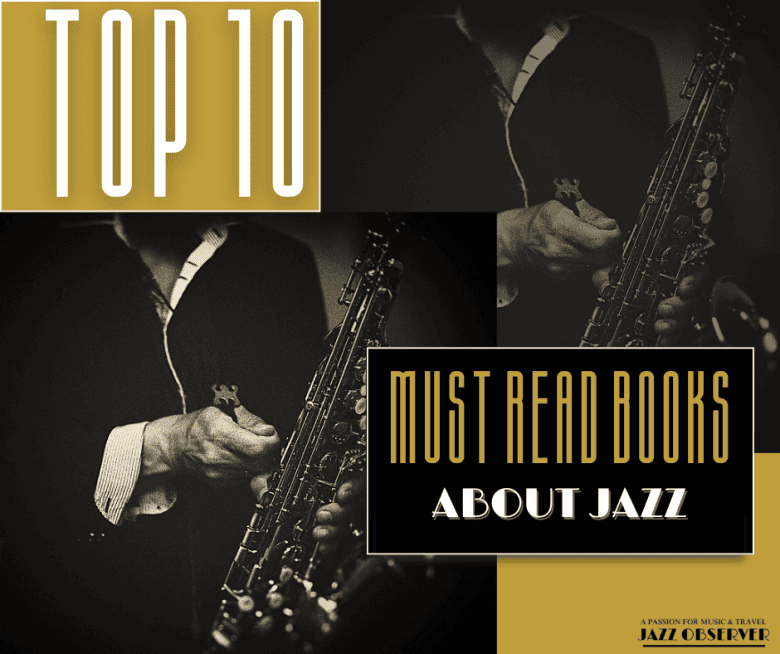THIS POST MAY CONTAIN COMPENSATED LINKS. FIND MORE INFO IN MY DISCLAIMER.
Curious about the best books that dive into the world of jazz? Whether you’re a seasoned aficionado or new to the genre, our top 10 must-read books about jazz will offer you captivating insights into its rich history and legendary figures. These selections cover the essential knowledge and stories you need, from comprehensive histories and biographies to insider perspectives.
“Jazz: A History of America’s Music” by Geoffrey C. Ward and Ken Burns
“Jazz: A History of America’s Music” by Geoffrey C. Ward and Ken Burns is a masterful exploration of jazz’s evolution and its diverse influences across America. Serving as a companion to the acclaimed PBS documentary series, this book brings the narrative of jazz to life through vivid storytelling. This book takes readers through the heart and soul of America’s music.
Ward and Burns focus on key historical periods, particularly the Jazz Age and the Swing Era, pivotal moments in the genre’s development. These eras saw the emergence of jazz as a dominant force in American culture, influencing everything from dance and fashion to social norms and racial integration. The book captures the excitement and energy of these times, painting a vivid picture of the jazz scene.
The authors also highlight the jazz legends who shaped the genre. Figures like Louis Armstrong and Duke Ellington are extensively discussed for their monumental impact on jazz history. Their contributions revolutionized jazz music and left an indelible mark on American culture. Through their stories, readers understand how jazz evolved and why it remains such an integral part of America’s musical heritage.
“Kansas City Lightning: The Rise and Times of Charlie Parker” by Stanley Crouch
In “Kansas City Lightning: The Rise and Times of Charlie Parker,” Stanley Crouch takes readers on a captivating journey through the early life of one of jazz’s most iconic figures, Charlie Parker. Parker’s formative years in Kansas City, a hotbed of early jazz, played a crucial role in shaping his unique musical style. Crouch’s narrative vividly captures the city’s vibrant jazz scene, making readers feel as if they are right there in the smoky clubs, listening to the birth of bebop.
Charlie Parker, known affectionately as “Bird,” revolutionized jazz music with his innovative approach to bebop. Crouch delves into Parker’s interactions with other jazz greats, such as Dizzy Gillespie and Sonny Rollins, illustrating how these collaborations pushed the boundaries of jazz. The book not only chronicles Parker’s musical achievements but also provides a broader cultural context, highlighting the social and racial dynamics of the time.
Crouch’s ability to weave Parker’s struggles and triumphs into the larger tapestry of jazz history sets this biography apart. By contextualizing Parker’s life within the broader cultural landscape, Crouch gives readers a deeper understanding of the man behind the music and his lasting impact on the jazz world.
“Miles: The Autobiography” by Miles Davis and Quincy Troupe
“Miles: The Autobiography” by Miles Davis and Quincy Troupe is a raw and unfiltered look into the life of one of jazz’s most influential figures. Miles Davis was a true innovator known for his groundbreaking work in various jazz movements, including cool jazz, hard bop, and jazz fusion. Co-authored by Quincy Troupe, this autobiography offers an honest and often gritty portrayal of Davis’ life, highlighting his struggles and flaws.
The writing style is informal and conversational, filled with the kind of profanity that reflects Davis’ raw and unvarnished personality. This approach makes the autobiography feel incredibly personal and intimate, as if Davis were speaking directly to the reader. He candidly discusses his influences, such as the Billy Eckstine band, and his collaborations with other jazz legends like Gil Evans and John Coltrane. These collaborations were pivotal in the evolution of jazz, leading to masterpieces that continue to influence musicians today.
Its unflinching honesty makes “Miles: The Autobiography” a must-read. Davis candidly discusses his battles with addiction and his complex relationships with race and authority. This raw honesty, combined with his musical genius, paints a complete picture of a man who was as complicated as he was talented.
It’s a definitive book for understanding not just Miles Davis but the transformative power of jazz and the Miles Davis masterpiece.
“John Coltrane: His Life and Music” by Lewis Porter
“John Coltrane: His Life and Music” by Lewis Porter is a profound exploration of the life and legacy of one of jazz’s most revered figures. John Coltrane’s spiritual journey is at the heart of this biography, particularly his creation of the groundbreaking album ‘A Love Supreme,’ often regarded as John Coltrane’s signature album. Recorded in December 1964, this album is a spiritual declaration, intertwining Coltrane’s musical expression with his deep faith in God.
The album’s four-part suite – ‘Acknowledgement,’ ‘Resolution,’ ‘Pursuance,’ and ‘Psalms’ – reflects Coltrane’s unique improvisational style and spiritual understanding. Each section represents a phase of his spiritual journey, with the music serving as a profound expression of his beliefs. Coltrane’s struggles with addiction and his subsequent spiritual awakening in 1957 profoundly influenced the creation of ‘A Love Supreme,’ making it more than just an album but a testament to his faith and resilience.
Porter explores the broader impact of Coltrane’s music on the jazz world. His innovative approach to improvisation and willingness to push free jazz‘s boundaries have left an enduring legacy.
The album inspired the Saint John Coltrane African Orthodox Church, a religious congregation that integrates Coltrane’s music and philosophies into its practices. This biography offers a comprehensive look at Coltrane’s public and private life, making it essential reading for anyone interested in the spiritual and musical evolution of this jazz legend.
“Thelonious Monk: The Life and Times of an American Original” by Robin D.G. Kelley
Robin D.G. Kelley’s “Thelonious Monk: The Life and Times of an American Original” is a detailed and affectionate portrait of one of jazz’s most enigmatic and innovative figures. Thelonious Monk is recognized as a foundational figure in jazz, known for his distinct style and improvisational skills. Kelley’s biography delves into Monk’s unique approach to music, which reshaped the sounds of bebop and contributed significantly to the evolution of modern jazz.
Monk’s unique musical notation and composition style distinguished him from his contemporaries. His unconventional approach to harmony and rhythm challenged traditional jazz norms, making his music both revolutionary and timeless. Kelley’s book provides a deep dive into Monk’s creative process, highlighting how his originality inspires jazz musicians and educators.
Beyond his musical contributions, Monk’s legacy endures as he remains one of the most revered figures in jazz. His influence extends beyond his lifetime, shaping future generations of musicians and contributing to the ongoing evolution of the genre. Kelley’s biography is not just a recounting of Monk’s life but a celebration of his enduring impact on the world of jazz.
The Jazzmen: How Duke Ellington, Louis Armstrong and Count Basie Changed America by Larry Tye is about three of history’s most important jazz musicians. The book looks at how Ellington, Armstrong, and Basie changed not only the face of jazz but also American culture, race relations, and the world of music.
Tye gives us in-depth portraits of each man, their early life, musical breakthroughs, and lasting impact. Armstrong’s trumpet playing and stage presence brought jazz into the mainstream, Ellington’s compositions and leadership of his orchestra redefined big band music, and Basie’s swing style set the template for modern jazz rhythm sections.
Beyond the music, the book looks at their struggles against racial barriers in a segregated America and their role in breaking down those barriers through their art and fame. Tye uses research – letters, interviews, historical records – to show how these three jazz giants changed music and society.
If you’re looking for must-read jazz books The Jazzmen is the one to read to understand jazz as a cultural phenomenon and the men who made it the cornerstone of American music.
“Bird Lives!: The High Life and Hard Times of Charlie (Yardbird) Parker” by Ross Russell
“Bird Lives!: The High Life and Hard Times of Charlie (Yardbird) Parker” by Ross Russell is a heartfelt and engaging biography of one of jazz’s most complex and influential figures. Charlie Parker, affectionately known as “Bird,” is celebrated for his musical genius and his role in revolutionizing jazz. Russell’s narrative vividly depicts Parker’s early career in Kansas City, where a vibrant club scene nurtured his talent.
Despite the darker aspects of Parker’s life, including his struggles with addiction, Russell emphasizes his relentless dedication to music. The biography serves as a testament to Parker’s cultural significance, portraying him as a complex figure who pushed the boundaries of jazz and left an indelible mark on the genre.
Russell’s work combines extensive research with a narrative style that reads like a novel, making it accessible for non-musicians. This biography highlights Parker’s musical achievements and provides a broader cultural context, illustrating the social and racial dynamics that influenced his life and work.
It’s a compelling read for anyone interested in the life of Charlie Parker and his enduring impact on jazz.
“Duke: A Life of Duke Ellington” by Terry Teachout
“Duke: A Life of Duke Ellington” by Terry Teachout offers a balanced and insightful look into the life of one of jazz’s most influential figures. Teachout presents a nuanced portrait of Ellington, addressing his strengths and flaws. The biography corrects misunderstandings about Ellington’s music, particularly his harmonic structures and composition.
Teachout uses contemporary press, and eyewitness accounts to illuminate Ellington’s relationships with musicians and other contemporaries. These relationships were integral to Ellington’s success and his ability to innovate and sustain his career over many decades. The book also defends Ellington against accusations of racism, emphasizing his efforts to uplift his race through music.
This biography is a comprehensive look at Ellington’s life and work, providing readers with a deeper understanding of his contributions to jazz and his enduring legacy. It’s an essential read for anyone interested in the history of jazz and the life of one of its greatest composers.
DownBeat – The Great Jazz Interviews: A 75th Anniversary Anthology by Frank Alkyer is a collection of the best of the best from DownBeat magazine, the world’s leading jazz publication. This 75th-anniversary anthology features interviews with jazz legends, composers, and industry leaders over the decades.
Miles Davis, John Coltrane, Duke Ellington, Thelonious Monk and many more. Firsthand accounts of the lives, creative processes, and philosophies of the jazz greats, often with candid moments and behind-the-scenes stories. The book also chronicles the evolution of jazz from swing to bebop to fusion and beyond, as told by the musicians who lived it.
You’ll enjoy the historical context and the DownBeat way of covering jazz. For jazz lover, historians and musicians
“Art Blakey’s Jazz Messengers” by Leslie Gourse
Sittin’ In: Jazz Clubs of the 1940s and 1950s is a captivating exploration of the vibrant jazz nightclub scene during these two influential decades. This beautifully crafted hardcover book features over 200 photographs, offering a rich visual journey through the clubs where jazz flourished. It also includes insightful interviews with legends like Quincy Jones, the celebrated trumpeter and saxophonist Sonny Rollins, and many others.
More than just a collection of images, this book masterfully captures the essence of jazz clubs in the ’40s and ’50s, often revealing fascinating details even devoted jazz history enthusiasts may not have encountered before. It provides a unique perspective on an era that shaped modern jazz, making it a compelling read for anyone passionate about the genre.
Summary
These ten must-read books comprehensively examine jazz’s rich history and vibrant world. From biographies of legendary musicians like Charlie Parker, Miles Davis, and John Coltrane to explorations of the cultural and historical contexts that shaped jazz, these books provide invaluable insights into this extraordinary genre. They highlight the contributions of key figures, the evolution of various jazz movements, and the enduring impact of jazz on American culture and beyond.
By delving into these books, readers can gain a deeper appreciation for the complexities of jazz and the incredible talents of the musicians who have shaped it. Whether you’re a seasoned jazz enthusiast or a curious newcomer, these books will enhance your understanding and love for this timeless and transformative music. Let the stories of these jazz legends inspire you and deepen your connection to the music that continues to captivate audiences worldwide.
Frequently Asked Questions
What makes “Jazz: A History of America’s Music” by Geoffrey C. Ward and Ken Burns a must-read?
“Jazz: A History of America’s Music” is a must-read because it vividly brings the evolution of jazz to life, showcasing key figures and historical moments that shaped the genre. You’ll be captivated by the rich stories and cultural significance woven throughout its pages.
How does “Kansas City Lightning: The Rise and Times of Charlie Parker” by Stanley Crouch stand out?
“Kansas City Lightning” stands out by deeply exploring Charlie Parker’s early life and the lively Kansas City jazz scene, showcasing his groundbreaking influence in bebop and his connections with other jazz legends. This rich background makes it a compelling read for any music enthusiast.
What is unique about “Miles: The Autobiography” by Miles Davis and Quincy Troupe?
“Miles: The Autobiography” offers a raw and intimate glimpse into Miles Davis’ life, highlighting his challenges and impact on jazz. It’s a deeply personal narrative that reveals the man behind the music.
Why is “John Coltrane: His Life and Music” by Lewis Porter important for jazz enthusiasts?
“John Coltrane: His Life and Music” by Lewis Porter is essential for jazz enthusiasts because it delves into Coltrane’s spiritual journey and the significance of his work, especially “A Love Supreme,” highlighting his unique improvisational style and lasting influence on jazz.







